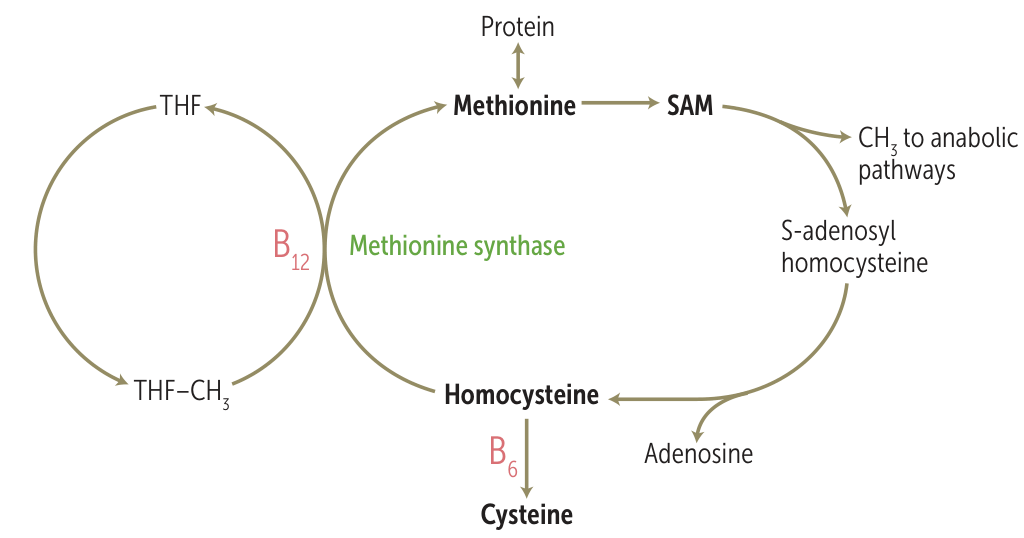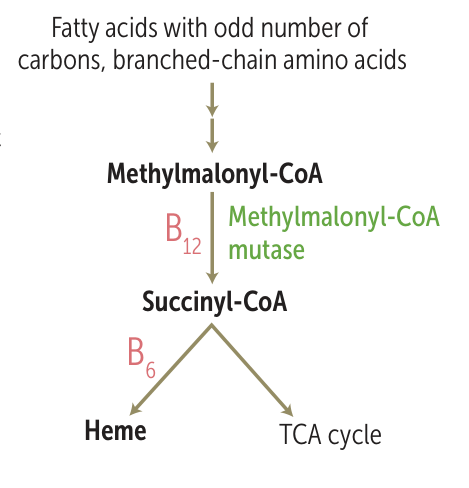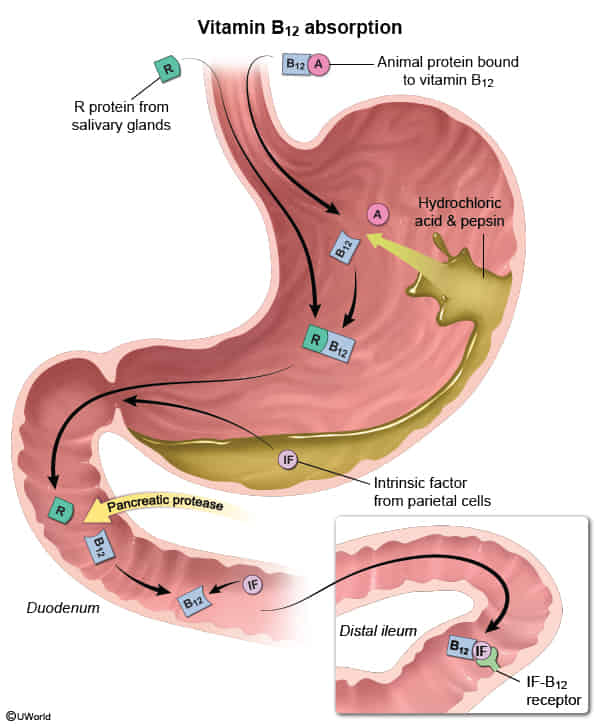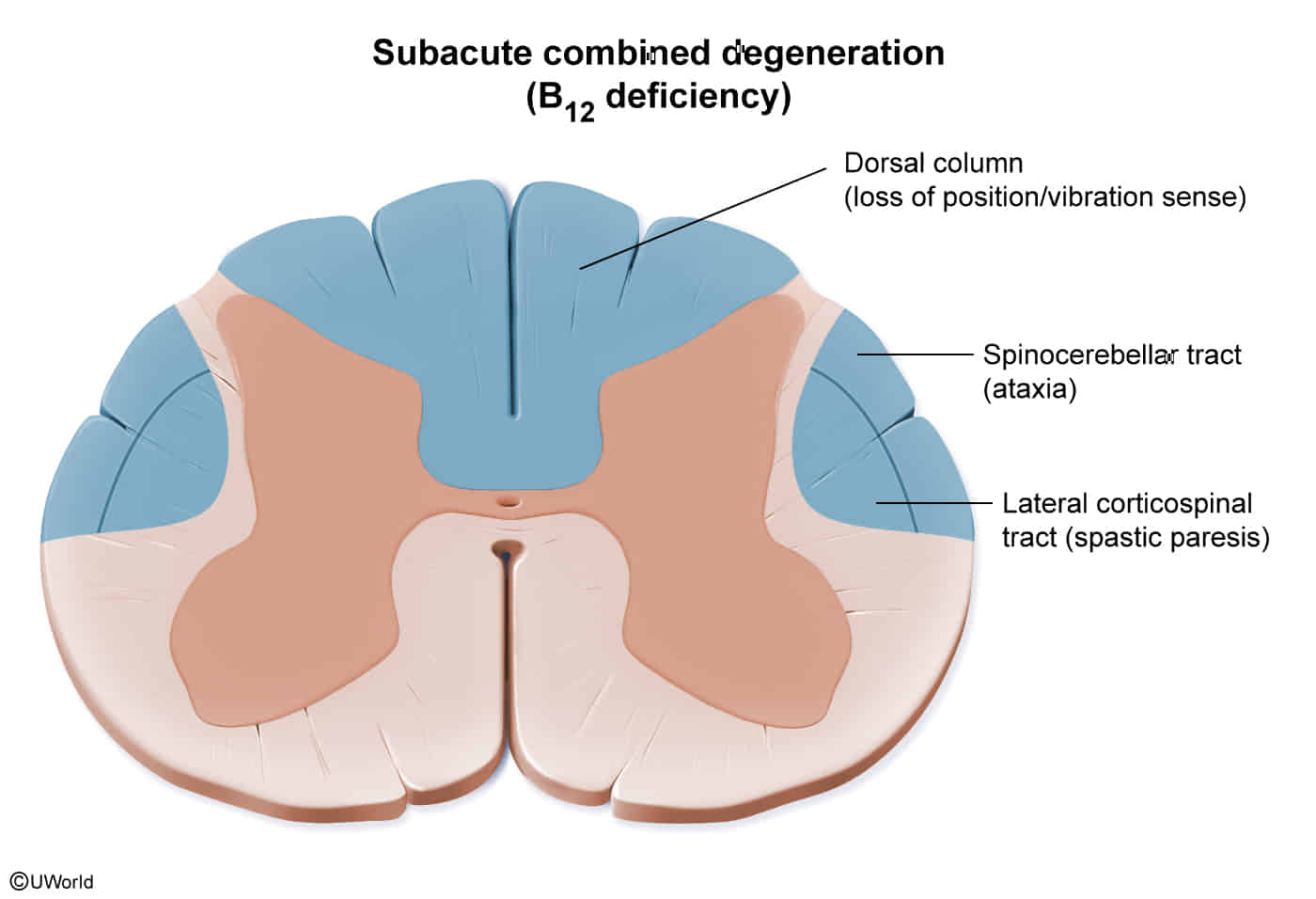Functions
- Cofactor for enzymes:
- Methionine synthase: Methylcobalamin is required for the transfer of methyl groups (e.g., in DNA synthesis).
- Deficiency leads to impaired DNA synthesis

- Deficiency leads to impaired DNA synthesis
- Methylmalonyl-CoA mutase (e.g., in odd-chain fatty acid metabolism)
- Deficiency leads to impaired myelin synthesis: the buildup of Methylmalonyl-CoA disrupts myelin

- Deficiency leads to impaired myelin synthesis: the buildup of Methylmalonyl-CoA disrupts myelin
- Hydroxocobalamin (precursor of vitamin B12) is used to treat Cyanide poisoning
- Methionine synthase: Methylcobalamin is required for the transfer of methyl groups (e.g., in DNA synthesis).
Epidemiology
Etiology
Attention
The liver can store approximately 1,000 times the daily vitamin B12 requirement; deficiency develops only after the complete absence of intake or absorption for 3-4 year

- Malabsorption
- ↓ Intrinsic factor (IF)
- Atrophic gastritis due to
- Autoimmune atrophic gastritis: most common cause of vitamin B12 deficiency
- H. pylori infection
- Gastrectomy
- Atrophic gastritis due to
- Reduced uptake of IF-vitamin B12 complex in terminal ileum due to:
- Alcohol use disorder
- Crohn disease, celiac disease
- Pancreatic insufficiency (e.g. Chronic pancreatitis)
- Pancreatic proteolytic enzymes are needed to release vitamin B12 from the vitamin B12–R protein complex (R protein is also known as transcobalamin I or haptocorrin), a necessary step that enables vitamin B12 to bind intrinsic factor, which ultimately facilitates terminal ileal absorption.
- Surgical resection of the ileum
- Diphyllobothrium latum (tapeworm) infection
- Bacterial overgrowth
- Enteritis
- Achlorhydria
- ↓ Intrinsic factor (IF)
- Malnutrition
- Anorexia nervosa
- Strict vegan diets: occurs only after years of a strict diet that excludes all animal products (unlike folate deficiency, which occurs within a few months of insufficient intake)
- Found almost exclusively in animal products (except yeast extract)
- Increased demand: e.g., during pregnancy, breastfeeding, fish tapeworm (Diphyllobothrium latum) infection, and leukemia
- Drugs: metformin
Pathophysiology
Dysfunctional biochemical reactions
- Dysfunctional methionine synthase (normally converts homocysteine to methionine, thereby demethylating N5-methyl-THF to THF)
- ↓ Tetrahydrofolate (THF; cofactor in purine synthesis) → ↓ DNA synthesis → large, nucleated hematopoietic cells, including megaloblasts → megaloblastic precursors undergo apoptosis or are phagocytosed by macrophages → pancytopenia (including megaloblastic anemia)
- ↓ Methionine → neuropathy
- ↑ Homocysteine → endothelial damage → predisposes to cardiovascular disease
- Can also cause secondary folate deficiency
- Dysfunctional methylmalonyl CoA mutase
- Methylmalonyl CoA cannot be converted to succinyl CoA → accumulation of methylmalonyl CoA and its precursor propionyl CoA, as well as their associated odd-chain fatty acids, which cannot be completely metabolized
- Propionyl CoA replaces acetyl CoA in neuronal membranes → demyelination → neurological manifestations
Pernicious anemia
- A type of vitamin B12 deficiency caused by autoantibodies against intrinsic factor and/or gastric parietal cells (type II hypersensitivity reaction)
- Antiparietal cell antibodies: target gastric parietal cells
- Causes ↓ acid production and atrophic gastritis
- In turn increases gastrin level
- ↓ Intrinsic factor production → ↓ vitamin B12 absorption in terminal ileum
- Causes ↓ acid production and atrophic gastritis
- Anti-IF antibodies: bind intrinsic factor and block the vitamin B12 binding site
- Antiparietal cell antibodies: target gastric parietal cells
- Associated with other autoimmune diseases (e.g., hypothyroidism, vitiligo)
- Increases the risk of gastric cancer
Clinical features
- Signs of anemia (e.g., fatigue, pallor)
- Neurological disturbances are generally symmetrical
- Peripheral neuropathy: tingling, numbness, pins-and-needles sensation, coldness (especially in the lower extremities)
- Subacute combined degeneration of spinal cord: symmetrical demyelination of the spinal cord tracts occurs in vitamin B12 deficiency due to insufficient vitamin B12-dependent fatty acid synthesis and production/maintenance of myelin

- It manifests with the following symptoms:
- Paresthesia, impaired proprioception, loss of vibratory sensation, tactile sensation, and position discrimination due to demyelination of the dorsal columns
- Spastic paresis due to demyelination of the lateral corticospinal tracts (axons of upper motor neurons)
- Gait abnormalities (spinal ataxia) resulting from the damage of spinocerebellar tracts and dorsal columns, Romberg test (+)
- Long-term deficiency can lead to irreversible neurological damage.
- It manifests with the following symptoms:
- Neuropsychiatric disease (e.g., reversible dementia, depression, paranoia)
- Worsening vision
- Autonomic dysfunction: impotence and incontinence
- Glossitis
Tip
Always consider vitamin B12 deficiency when evaluating patients with dementia.
Diagnostics
- If vitamin B12 serum levels are normal:
- Measure homocysteine: elevated in both vitamin B12 deficiency and folate deficiency
- Measure methylmalonic acid (MMA) to help rule out folate deficiency (MMA is normal in folate deficiency and elevated in vitamin B12 deficiency)
- Without vitamin B12, methylmalonyl CoA mutase cannot break down methylmalonyl CoA, which leads to the accumulation of MMA.

- Without vitamin B12, methylmalonyl CoA mutase cannot break down methylmalonyl CoA, which leads to the accumulation of MMA.